- Home
- Hugh Howey
Third Shift - Pact s-3 Page 2
Third Shift - Pact s-3 Read online
Page 2
“Hurry, son!”
Jimmy cried out in relief. He stumbled away from Yani, who was writhing on the floor and making awful, inhuman sounds, and ran to his father, limping and clutching his arm.
“Where’s your mother?” his dad asked, peering down the hall.
“The stairs—” Jimmy fought for a breath. His pulse had blurred into a steady thrum. “Dad, what’s going on?”
“Inside. Inside.” He pulled Jimmy down the hall toward a large door of stainless steel. There were shouts from around the corner. His father was on full alert; Jimmy could see the veins standing out in his dad’s forehead, trickles of sweat beading beneath his thinning hair. His father keyed a code into the panel by the massive door. There was a whirring and a series of clunks before it opened a crack. His dad leaned into the door until there was room for the two of them to squeeze through. “C’mon, son. Move.”
Down the hall, someone yelled at them to stop. Boots clomped their way. Jimmy squeezed through the crack, was worried his dad might close him up in there, all alone, but his old man worked his way through as well, then leaned on the inside of the door.
“Push!” he said.
Jimmy pushed. He didn’t know why they were pushing, but he’d never seen his dad frightened before. It made his insides feel like jelly. The boots outside stomped closer. Someone yelled his father’s name. Someone yelled for Yani.
As the steel door slammed shut, a slap of hands hit the other side. There was a whir and a clunk once more. His dad keyed something into the pad, then hesitated. “A number,” he said, gasping for breath. “Four digits. Quick, son, a number you’ll remember.”
“One two one eight,” Jimmy said. Level twelve and level eighteen. Where he lived and where he went to school. His father keyed in the digits. There were muffled yells from the other side, soft ringing sounds from palms slapping futilely against the thick steel.
“Come with me,” his father said. “We’ve got to keep an eye on the cameras, find your mother.” He slung the black machine over his back, which Jimmy saw was a bigger version of the pistol. The end was no longer smoking. His father hadn’t kicked Yani from a distance; he had shot him.
Jimmy stood motionless while his father set off through the room of large black boxes. It dawned on him that he’d heard of the room. This was where his father had shadowed. The server room. The machines seemed to watch him as he stood there by the door. They were black sentries, quietly humming, standing guard.
Jimmy left the wall of stainless steel with its muffled slaps and muted shouts and hurried after his father. He had seen his dad’s office before, back down the hall and around a bend, but never this place. The room was huge. He favored one leg as he ran the full length of it, trying to pick his way through the servers and keep track of where his dad had gone. At the far wall, he rounded the last black box and found his dad kneeling on the floor as if in prayer. Bringing his hands up around his neck, his dad dug inside his coveralls and came out with a thin black cord. Something silver danced on the end of it.
“What about Mom?” Jimmy asked. He wondered how they would let her in with the rest of those guys outside. He wondered why his father was kneeling on the floor like that.
“Listen carefully,” his dad said. “This is the key to the silo. There are only two of these. Do not ever lose sight of it, okay?”
Jimmy watched as his father inserted the key into the back of one of the machines. “This is the comm hub,” his dad said. Jimmy had no idea what a comm hub was, only that they were going to hide inside of one. That was the plan. Get inside one of the black boxes until the noise went away. His dad turned the key as if unlocking something, did this three more times in three more slots, then pulled the panel away. Jimmy peered inside and watched his dad pull a lever. There was a grinding noise in the floor nearby.
“Keep this safe,” his father said. He squeezed Jimmy’s shoulder and handed him the lanyard with the key. Jimmy accepted it and studied the jagged piece of silver amid the coil of black cord. One side of the key formed a circle with three wedges inside, the symbol of the silo. He teased the lanyard into a hoop and pulled it down over his head, then watched his dad dig his fingers into the grating by their feet. A rectangle of flooring was lifted out to reveal darkness underneath.
“Go on. You first,” his father said. He waved at the hole in the ground and began unslinging the long pistol from his back. Jimmy shuffled forward a little and peered down. There were handholds on one wall. It was like a ladder, but much taller than any he’d ever seen.
“C’mon, son. We don’t have much time.”
Sitting on the edge of the grating, his feet hanging in the void, Jimmy reached for the steel rungs below and began the long descent.
The air beneath the floor was cool, the light dim. The horror and noise of the stairwell seemed to fade, and Jimmy was left with a sense of foreboding, of dread. Why was he being given this key? What was this place? He favored his injured arm and made slow but steady progress.
At the bottom of the ladder, he found a narrow passageway. There was a dim pulse of light at the far end. Looking up, he could see the outline of his father making his way down. The light above pulsed as well, a red throbbing, an unpleasant sight.
“Through there,” his father said, indicating the slender hallway. He left the long pistol leaned up against the ladder.
“Shouldn’t we cover the—?” Jimmy pointed up.
“I’ll get it on my way out. Let’s go, son.”
Jimmy turned and worked his way through the passage. There were wires and pipes running in parallel across the ceiling. A light ahead beat crimson. After twenty paces or so, the passage opened on a space that reminded him of the school stockroom. There were shelves along two walls. Two desks as well—one with a computer, the other with an open book. His dad went straight for the computer. “You were with your mother?” he asked.
Jimmy nodded. “She pulled me out of class. We got separated on the stairs.” He rubbed his sore shoulder while his father collapsed heavily into the chair in front of the desk. The computer screen was divided into four squares.
“Where did you lose her? How far up?”
“Two turns above thirty-four,” he said, remembering the fall.
Rather than reach for the mouse or keyboard, his father grabbed a black box studded with knobs and switches. There was a wire attached to the box that trailed off toward the back of the monitor. In one corner of the screen, Jimmy saw a moving picture of three men standing over someone lying still on the floor. It was real. It was an image, a window, like the cafeteria wallscreen. He was seeing a view of the hallway they’d just left.
“Fucking Yani,” his father muttered.
Jimmy’s eyes fell from the screen to stare at the back of his dad’s head. He’d heard his old man curse before, but never that word. His father’s shoulders were rising and falling as he took deep breaths. Jimmy returned his attention to the screen.
The four windows had become twelve. No, sixteen. His father leaned forward, his nose just inches from the monitor, and peered from one square to the next. His old hands worked the black box, which clicked as the knobs and dials were adjusted. Jimmy saw in every square the turmoil he’d witnessed on the stairway. From rail to post, the treads were packed with people. They surged upward. His father traced the squares with a finger, searching.
“Dad—”
“Shhh.”
“—what’s going on?”
“We’ve had a breach,” he said. “They’re trying to shut us down. You said it was two turns above the landing?”
“Yeah. But she was being carried up. It was hard to move. I went over the rail—”
The chair squeaked as his father turned and sized him up. His eyes fell to Jimmy’s arm, pinned against his chest. “You fell?”
“I’m okay. Dad, what’s going on? Trying to shut what down?”
His father returned his focus to the screen. A few clicks from the black box, and the square
s flickered and changed. They now seemed to be peering through slightly different windows.
“They’re trying to shut down our silo,” his father said. “The bastards opened our airlock, said our gas supply was tainted— Wait. There she is.”
The many little windows became one. The view shifted slightly. Jimmy could see his mother pinned between a crush of people and the rail. Her mouth and chin were covered in blood. Gripping the rail and fighting for room, she lurched down one laborious step as the crowd coursed the other direction. It seemed as though everyone in the silo was trying to get topside. Jimmy’s father slapped the table and stood abruptly. “Wait here,” he said. He stepped toward the narrow passage, stopped, looked back at Jimmy, seemed to consider something. There was a strange shine in his eyes.
“Quick, now. Just in case.” He hurried the other direction, past Jimmy, and through a door leading out of the room. Jimmy hurried after him, frightened, confused, and limping.
“This is a lot like our stove,” his father said, patting an ancient thing in the corner of the next room. “Older model, but it works the same.” There was a wild look in his father’s eyes. He spun and indicated another door. “Storehouse, bunkroom, showers, all through there. Food enough to last four people for ten years. Be smart, son.”
“Dad— I don’t understand—”
“Tuck that key in,” his father said, pointing at Jimmy’s chest. Jimmy had left the lanyard outside of his coveralls. “Do not lose that key, okay? What’s the number you said you’d never forget?”
“Twelve-eighteen,” Jimmy said.
“Okay. Come in here. Let me show you how the radio works.”
Jimmy took a last look around this second room. He didn’t want to be left alone down there. That’s what his father was doing, leaving him down between the levels, hidden in the concrete. The world felt heavy all around him.
“I’ll come with you to get her,” he said, thinking of those men slapping their hands against the great steel door. His father couldn’t go alone, even with the big pistol.
“Don’t open the door for anyone but me or your mother,” his father said, ignoring his son’s pleas. “Now watch closely. We don’t have much time.” He indicated a box on the wall. The box was locked behind a metal cage, but there were some switches and dials on the outside. “Power’s here.” His father tapped one of the knobs. “Keep turning this way for volume.” His father did this, and the room was filled with an awful hiss. He pulled a device off the wall and handed it to Jimmy. It was attached to the noisy box by a wavy bit of stretchy cord. His dad grabbed another device from a rack on the wall. There were several of them there.
“Hear this? Hear this?” His father spoke into the portable device, and his voice replaced the loud hiss from the box on the wall. “Squeeze that button and talk into the mic.” He pointed to the unit in Jimmy’s hands. Jimmy did as he was told.
“I hear you,” Jimmy said hesitantly, and it was strange to hear his voice emanate from the small unit in his father’s hands.
“What’s the number?” his dad asked.
“Twelve-eighteen,” Jimmy said.
“Okay. Stay here, son.” His father appraised him for a moment, then stepped forward and grabbed the back of Jimmy’s neck. He kissed his son on the forehead, and Jimmy remembered the last time his father had kissed him like that. It was right before he had disappeared for three months, before his father had become a shadow, back when Jimmy was a little boy.
“When I put the grate back in place, it’ll lock itself. There’s a handle below to re-open it. Are you okay?”
Jimmy nodded. His father glanced up at the red, pulsing lights and frowned.
“Whatever you do,” he said. “Do not open that door for anyone but me or your mother. Understand?”
“I understand.” Jimmy clutched his arm and tried to be brave. There was another of the long pistols leaning up against the desk with the open book. He didn’t understand why he couldn’t come as well. He reached for the black gun. “Dad—”
“Stay here,” his father said.
Jimmy nodded.
“Good man.” He rubbed Jimmy’s head and smiled, then turned and disappeared down that dark and narrow corridor. The lights overhead winked on and off, a red throbbing like a pulse. There was the distant clang of boots on metal rungs, swallowed by the darkness and soon silent. And then Jimmy Parker was alone.
Silo 1
A Third Shift
•4•
Donald couldn’t feel his toes. His feet were bare and had yet to thaw. They were bare, but all around him were boots. Boots everywhere. Boots on the men pushing him through aisles of gleaming pods. Boots standing still while they took his blood and told him to pee. Stiff boots that squeaked in the lift as grown men shifted nervously in place. And up above, a frantic hall greeted them where men stomped by in boots, a hall laden with shouts and nervous, lowered brows. They pushed him to a small apartment and left him alone to clean up and thaw out. Outside his door, more boots clomped up and down, up and down. Hurrying, hurrying. A world of worry, confusion, and noise in which to wake.
Donald remained half asleep, sitting on a bed, his consciousness floating somewhere above the floor. Deep exhaustion gripped him. He was back to aboveground days, back when stirring and waking were two separate things. Mornings when he gained consciousness in the shower or behind the wheel on his way into work, long after he had begun to move. The mind lagged behind the body; it swam through the dust kicked up by numb and shuffling feet. Waking from decades of freezing cold felt like this. Dreams of which he was dimly aware slipped from his grasp, and Donald was eager to let them go.
The apartment they’d brought him to was down the hall from his old office. They had passed it along the way. That meant he was on the operations wing, a place he used to work. An empty pair of boots sat on the foot of the bed. Donald stared at them numbly. The name “Thurman” wrapped around the back of each ankle in faded black marker. Somehow, these boots were meant for him. They had been calling him Mr. Thurman since he woke up, but that was not who he was. A mistake had been made. A mistake or a cruel trick. Some kind of game.
Fifteen minutes to get ready. That’s what they’d said. Ready for what? Donald sat on the double cot, wrapped in a blanket, occasionally shivering. The wheelchair had been left with him. Thoughts and memories reluctantly assembled like exhausted soldiers roused from their bunks in the middle of the night and told to form ranks in the freezing rain.
My name is Donald, he reminded himself. He must not let that go. This was the first and most primal thing. Who he was.
Sensation and awareness gathered. Donald could feel the dent in the mattress the size and shape of another’s body. This depression left behind by another tugged at him. On the wall behind the door, a crater stood where the knob had struck, where the door had been flung open. An emergency, perhaps. A fight or an accident. Someone barging inside. A scene of violence. Hundreds of years of stories he wasn’t privy to. Fifteen minutes to get his thoughts together.
There was an ID badge on the bedside table with a barcode and a name. No picture, fortunately. Donald touched the badge, remembered seeing it in use. He left it where it was and rose shakily on unsure legs, held the wheelchair for support, and moved toward the small bathroom.
There was a bandage on his arm where the doctor had drawn his blood. Doctor Wilson. He’d already given a urine sample, but he needed to pee again. Allowing his blanket to fall open, he stood over the toilet. The stream was pink. Donald thought he remembered it being the color of charcoal on his last shift. When he finished, he stepped into the shower to wash off the stink of flesh in a cast too long, that film of death on the surface of something that refuses to die.
The water was hot, his bones cold. Donald shivered in a fog of steam. He opened his mouth and allowed the spray to hit his tongue and fill his cheeks. He scrubbed at the memory of poison on his flesh, a memory that made it impossible to feel clean. For a moment, it wasn’t t
he scalding water burning his skin—it was the air. The outside air. But then he turned off the flow of water and the burning lessened.
He toweled off and found the coveralls left out for him. They were too big. Donald shrugged them on anyway, the fabric rough against skin that had lain bare for a century. There was a knock at the door as he worked the zipper up to his neck. Someone called a name that was not his, a name scrawled around the backs of the boots lying perfectly still on the bed, a name that graced the badge sitting on the bedside table.
“Coming,” Donald croaked, his voice thin and weak. He slid the badge into his pocket and sat heavily on the bed. He rolled up his cuffs, all that extra material, before pulling the boots on one at a time. He fumbled with the laces, stood, and found that he could wiggle his toes in the space left behind by another.
* * *
Many years ago, Donald Keene had been elevated by a simple change in title. Power and importance had come in an instant. For all his life, he had been a man to whom few listened. A man with a degree, a string of jobs, a wife, a modest home. And then one night, a computer tallied stacks of ballots, and Donald Keene became Congressman Keene. He became one of hundreds with his hand on some great tiller—a struggle of hands pushing, pulling, and fitfully steering.
It had happened overnight, and it was happening again.
“How’re you feeling, sir?”
The man outside his apartment studied Donald with concern. The badge around his neck read “Eren.” He was the Ops Head, the one who manned the shrink’s desk down the hall, one among the pairs of boots that had woken him.
“Still groggy,” Donald said quietly. A gentleman in bright blue coveralls raced by and disappeared around the bend. A gentle breeze followed, a stir of air that smelled of coffee and perspiration, and then was gone.
“Are you good to walk? I’m sorry about the rush, but then I’m sure you’re used to it.” Eren pointed down the hall. “They’re waiting in the comm room.”

 Refuse (The Silo Archipelago Series Book 1)
Refuse (The Silo Archipelago Series Book 1)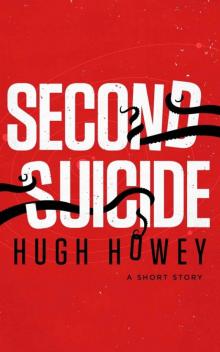 Second Suicide: A Short Story
Second Suicide: A Short Story Machine Learning: New and Collected Stories
Machine Learning: New and Collected Stories The Walk Up Nameless Ridge
The Walk Up Nameless Ridge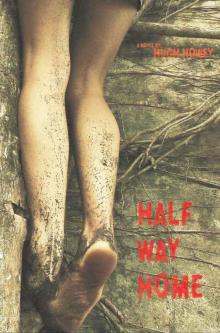 Half Way Home
Half Way Home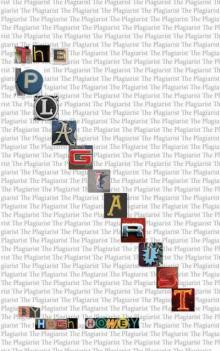 The Plagiarist
The Plagiarist Peace in Amber
Peace in Amber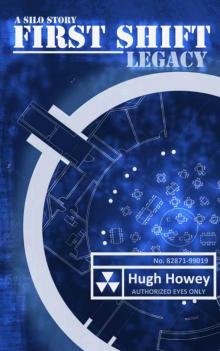 First Shift: Legacy
First Shift: Legacy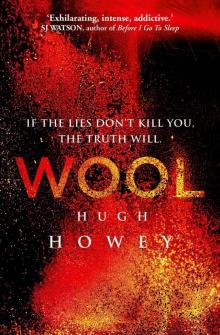 Wool
Wool Glitch
Glitch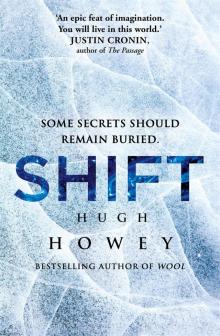 Shift
Shift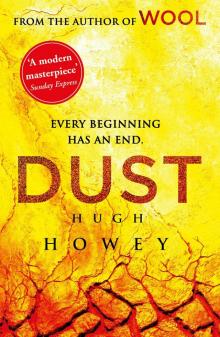 Dust
Dust Molly Fyde and the Land of Light
Molly Fyde and the Land of Light The Shell Collector
The Shell Collector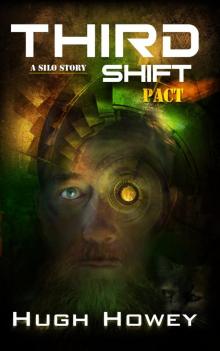 Third Shift: Pact
Third Shift: Pact Molly Fyde and the Fight for Peace
Molly Fyde and the Fight for Peace Sand Omnibus
Sand Omnibus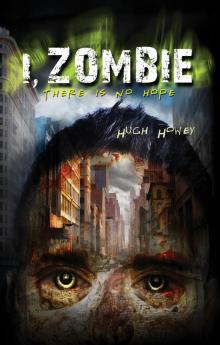 I, Zombie
I, Zombie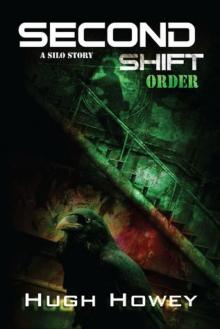 Second Shift: Order
Second Shift: Order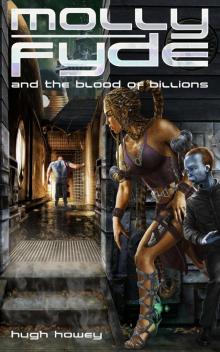 Molly Fyde and the Blood of Billions
Molly Fyde and the Blood of Billions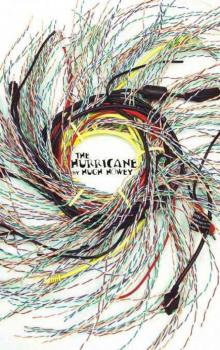 The Hurricane
The Hurricane The Box
The Box Glitch_A Short Story
Glitch_A Short Story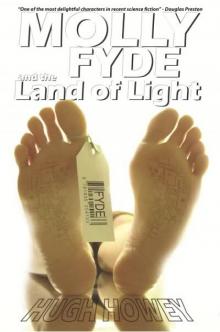 Molly Fyde and the Land of Light tbs-2
Molly Fyde and the Land of Light tbs-2 Machine Learning
Machine Learning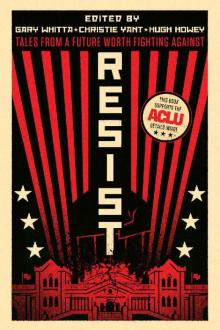 Resist
Resist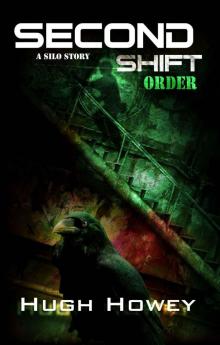 Second Shift - Order (Part 7 of the Silo Series) (Wool)
Second Shift - Order (Part 7 of the Silo Series) (Wool)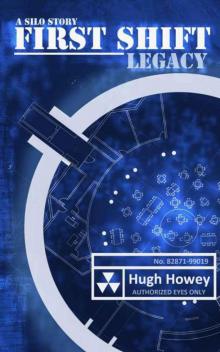 First Shift - Legacy s-1
First Shift - Legacy s-1 Stories on the Go: 101 Very Short Stories by 101 Authors
Stories on the Go: 101 Very Short Stories by 101 Authors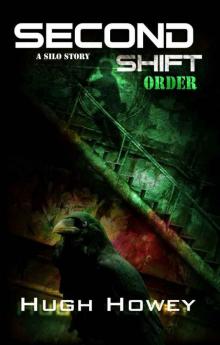 Second Shift - Order s-2
Second Shift - Order s-2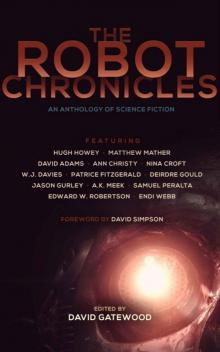 The Robot Chronicles
The Robot Chronicles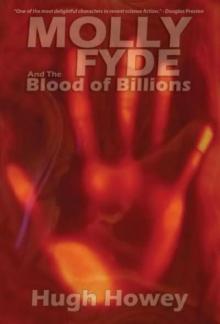 Molly Fyde and the Blood of Billions tbs-3
Molly Fyde and the Blood of Billions tbs-3 Molly Fyde and the Parsona Rescue tbs-1
Molly Fyde and the Parsona Rescue tbs-1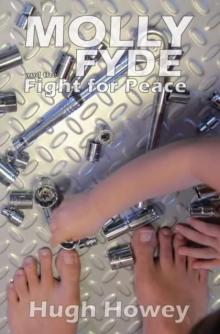 Molly Fyde and the Fight for Peace tbs-4
Molly Fyde and the Fight for Peace tbs-4 Sand
Sand The Walk Up Nameless Ridge (Kindle Single)
The Walk Up Nameless Ridge (Kindle Single)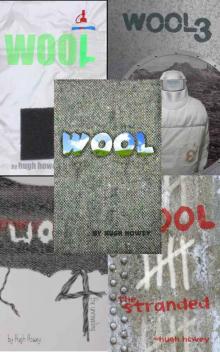 Wool Omnibus Edition (Wool 1 - 5)
Wool Omnibus Edition (Wool 1 - 5) The World of Kurt Vonnegut: Peace in Amber
The World of Kurt Vonnegut: Peace in Amber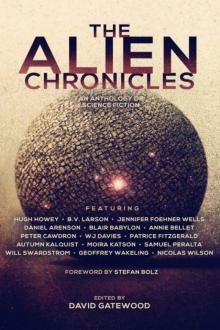 The Alien Chronicles
The Alien Chronicles Glitch: A Short Story (Kindle Single)
Glitch: A Short Story (Kindle Single)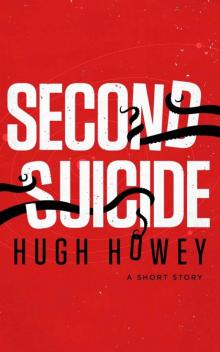 Second Suicide: A Short Story (Kindle Single)
Second Suicide: A Short Story (Kindle Single)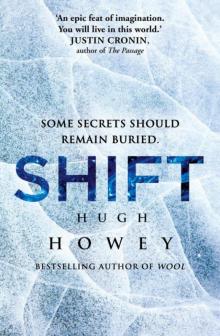 Shift (silo)
Shift (silo)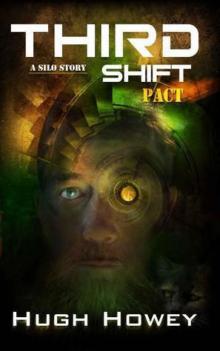 Third Shift - Pact
Third Shift - Pact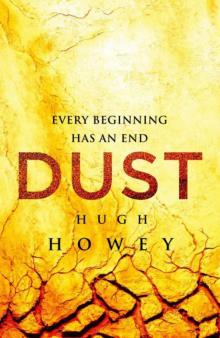 Dust s-9
Dust s-9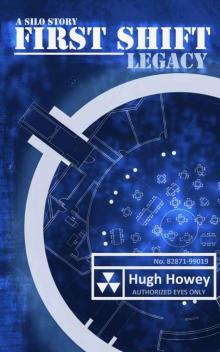 First Shift - Legacy (Part 6 of the Silo Series) (Wool)
First Shift - Legacy (Part 6 of the Silo Series) (Wool)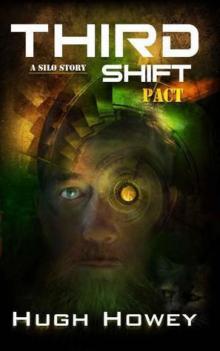 Third Shift - Pact s-3
Third Shift - Pact s-3 Sand: Omnibus Edition
Sand: Omnibus Edition The Box: A Short Story
The Box: A Short Story